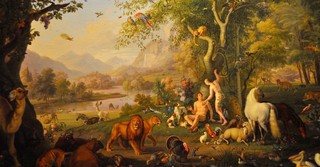
- Recent Translations
- All Translations
Bereshis 2:10
Share
Settings
Bereshis 2:10 Meaning and Commentary
And a river went out of Eden to water the garden
Before man was created, as Aben Ezra observes, this river went out of Eden and watered it on every side; but what river is here meant, is hard to say. It is more generally thought to be the river Euphrates, when that and the Tigris met, and became one stream or river, and as such entered and passed through Eden; and as it was parted into four rivers afterwards, in two of which they retained their names: the learned Reland F11 thinks, this river is now lost; but the learned writer before referred to thinks, as has been observed, that it is the river Jordan; see note on "Ge 2:8"
and which, as Pliny F12 says, was a very pleasant river:
and from thence it was parted, and became into four heads;
after it had passed through Eden, and the garden in it, watering it, it divided into four parts or heads of water, or four chief principal rivers, hereafter mentioned; and which circumstance the above writer thinks makes it the more probable to be the river Jordan, which and with the four rivers are spoken of together by the son of Sirach, in the Apocrypha:
``25 He filleth all things with his wisdom, as Phison and as Tigris in the time of the new fruits. 26 He maketh the understanding to abound like Euphrates, and as Jordan in the time of the harvest. 27 He maketh the doctrine of knowledge appear as the light, and as Geon in the time of vintage.'' (Sirach 24)
of which in the following verses. This river may be an emblem of the everlasting love of God, that pure river of water of life, which springs from the throne of God, and of the Lamb, from divine sovereignty, and not from the faith, love, and obedience of man; that river, the streams whereof make glad the city of God, and which water the garden, the church, revive its plants, and make it fruitful and delightful; the four heads or branches of which are eternal election of God, particular redemption by Christ, regeneration and sanctification by the Spirit, and eternal life and happiness, as the free gift of God through Christ; see ( Psalms 46:4 ) ( Revelation 22:1 ) .
F11 Dissert. de Paradiso, p. 53.
F12 Nat. Hist. l. 5. c. 15.
Bereshis 2:10 In-Context
Related Articles
Videos for Bereshis 2:10

